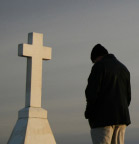Find the cost of freedom,
buried in the ground.
Mother earth will swallow you,
lay your body down.
As U.S. citizens celebrate this Independence Day, let's remember that cost that has been paid to purchase freedom - not just for a nation, but for all people!
There was a war for all the human race in which freedom for all people was purchased. This freedom was purchased at great cost as well. The symbol of that cost is not a hillside of white crosses or the Tomb of the Unknown or a black wall of names. As precious as these symbols are to those who know them and the people they represent, they do not compare to the symbol of the Empty Tomb. This symbol transcends ethnic and national boundaries.
The Empty Tomb is the symbol of the cost of true freedom for all people - the cost of Jesus leaving the security and power of heaven and becoming earthbound and mortal (Philippians 2:5-11). It is the symbol of the degradation of crucifixion before a jeering and mocking mob. It is the symbol of an agonizing death on a cross when he had the power to prevent it. It is also the symbol of three days in the ground - Jesus literally lay his body down. But the words to this tune are different. "Find the cost of freedom, no longer in the ground."
You see, the Empty Tomb is the sign of ultimate freedom. It is the reminder that we no longer have to fear death. All of our mortal fears are conquered. As the apostle Paul says:
Death is swallowed up in victory.
O death, where is your victory?
O death, where is your sting?
(1 Corinthians 15:54-55 NLT).
For the Christian, Independence Day doesn't come once a year. No, for Jesus' followers, Independence day comes every Sunday! The early Christians met on the first day of the week, the Lord's Day (Revelation 1:10), Sunday, to take of the Lord's Supper (Acts 20:7). This is their Independence Day. By the end of the first century, Sunday had become the Lord's Day. On this day they remembered the Lord's death and anticipated his return because freedom from death had been won. Independence Day is the day of the Empty Tomb! So as each Sunday approaches, let's remember the cost of our freedom and give thanks!
Since the children have flesh and blood, he (Jesus) too shared in their humanity so that by his death he might destroy him who holds the power of death - that is the devil - and free those who all their lives were held in slavery by their fear of death (Hebrews 2:14-15).
How has Jesus brought you independence?
How would Sunday, and Communion, be different if we celebrated it in light of the resurrection and Jesus victory and not just remembering the crucifixion?
Do you think there is something important about the early Christians taking the Lord's Supper on the first day of the week, the day of Jesus' resurrection, rather than taking it on the day of his crucifixion?
I'd love to hear from you on my blog about this:
http://www.heartlight.org/thephilfiles












Comments
Have thoughts on this article? Leave a comment